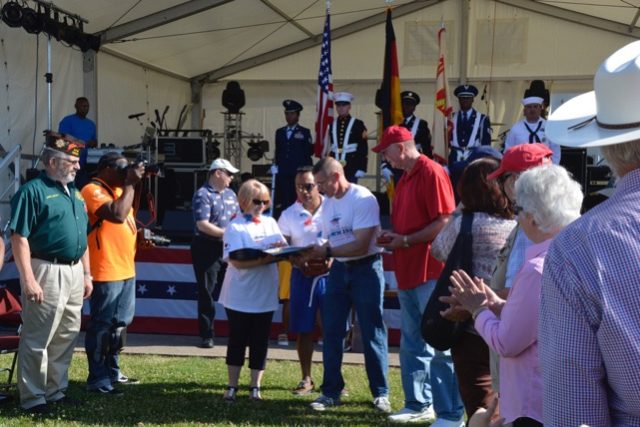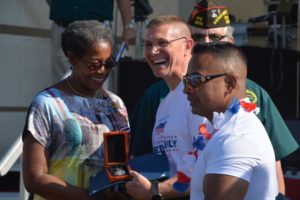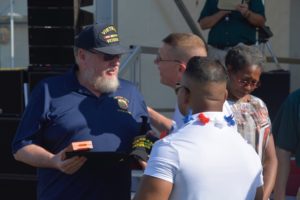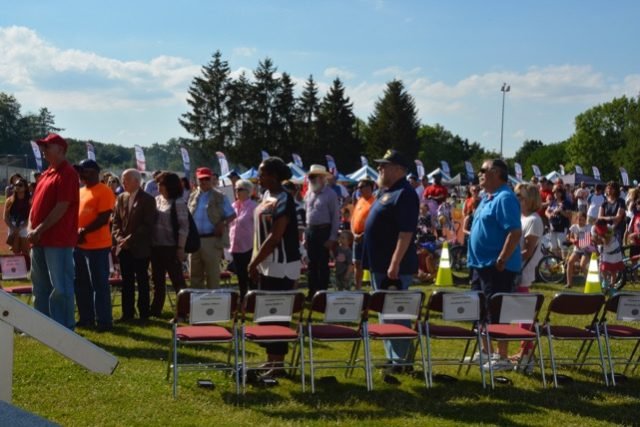
By John Reese
USAG Stuttgart Public Affairs
Warriors of all U.S. branches who served in the 1960s/1970s were often overlooked or worse during Vietnam era and the intervening years since the war officially ended, April 30, 1975. To address this, the U.S. Army Garrison Stuttgart recognized Vietnam veterans as part of the 4th of July activities on Husky Field, Patch Barracks.
The ceremony was organized by Veterans of Foreign Wars Post 10810. Its members, some of whom are also Vietnam vets, spoke about what it was like to serve then and read the names of their comrades present on the field.
The garrison command team presented pins and certificates to the Vietnam veterans present. Col. Glenn K. Dickenson, commander, USAG Stuttgart, personally greeted and thanked each of the veterans for serving during a time when service to the country unpopular. Dickenson was joined by his battle buddy, Command Sgt. Maj. Mariano Z. Alvarez, and garrison deputy Heidi Malarchik, as he moved through their ranks.
The service members, now older and grayer, were introduced to a large gathering of community members who ranged in age from peers to great grandchildren. Not all of the vets served on the ground in what was then South Vietnam; some served stateside, others flew missions above or were aboard ships off the coast. Some of the veterans present were drafted before conscription in the U.S. ended in 1973, while others had volunteered.

All present served honorably and continue to serve as DoD civilians
“Being recognized on the 4th of July was very rewarding,” said Kaffie R. Clark, PhD, coordinator for the garrison’s Employee Assistance Program. “To know that today I am in a small number of survivors of that era sends a message to many who weren’t even born yet, that there is honor in serving at any age.”
After completing basic training at Fort Jackson, South Carolina, and advanced training at Fort Gordon, Georgia to become a 72C (Army central office switchboard operator), Clark served as a member of the Women’s Army Corps.
“Serving during that period was very difficult,” Clark said. “Being oppressed by the military for being a female that wasn’t even classified as a Soldier! We were WACs back then; harassed on a daily basis for being in ‘this man’s Army’ and no SHARP Victim Advocates back then, either.”
The country was in full rejection mode toward the veterans who came home, Clark recalled. There was no fanfare, no parades, not even a kind word. Any acknowledgement of her service was negative or hurtful, leaving her feeling empty and confused. There was no draft for women; Clark had volunteered to serve her country.
“I witnessed shell-shocked, seemingly strong, men who would dive for cover if a car backfired. To a young college kid, this was all too poignant to comprehend,” she said.

For former Sailor Kerry Dauphinee, it was the second time he has been officially recognized as a Vietnam veteran. The first time was at a Medal of Honor recipient ceremony about a decade ago.
“It feels awkward when someone says ‘thank you for your service.’ I often think of the ultimate sacrifices of the many men and women who never came home, and then the ones who came home with their lives forever changed,” Dauphinee said. “Sometimes people say to me ‘welcome home;’ again, I feel awkward. I always say thank you, then I think I wish I could have contributed more during my two deployment to Vietnam.”
Dauphinee, working as a ships serviceman in the supply department, served aboard the USS Hancock (CVA-19), an Essex-class aircraft carrier that had sustained multiple kamikaze attacks during WW II and remained in service through the Korean War and Vietnam
“It was an honor to serve on ‘Hannah,’ as she was affectionately called,” Dauphinee recalled. “On April 29, 1975, Hannah was one of many ships off the coast of Vietnam to support “Operation Frequent Wind.” By the end of the day, over 2,500 Vietnamese men, women and children were safely on board Hannah.”
While he was never personally harassed during his time in uniform, Dauphinee remembers the protests against the American involvement in Vietnam.
“I received my draft notice in 1972 … in those days people were burning their draft notices and the student protests were staggering to see,” he said.
For Clark, her memories are still as vibrant today as they were 40 years ago.
“As one of my assignments at Fort Ord as a specialist, I was a member of a burial detail that stood silently, at attention, before grieving families that had lost their loved one to a ‘senseless’ war,” she said. “Hearing Taps today takes me back to those dreadful moments when only my pride in wearing the uniform helped me hold it together.”

The following Vietnam veterans present were recognized:
Richard A. Cline
Donald J. Jenkins
Donald H. Mcclellan
William L. Di Gennaro
Angel R. Ribot Melendez
Sumner T. Sherman, Jr.
Michael W. Geoghegan
Thomas W. Fray
George J. Hernandez
Augustin R. Smith
Kerry Dauphinee
Kaffie R. Clark,
John L. Leffler
Wayne J. Holder
Recognized but not in attendance:
Haywood Donelson, Jr.
William Lally
William Goble
Marcus Briscoe
Uwe Siemers
Robert N. Schwartz
